Interviews 1999 (Part One)
...The start of 1999 saw the promise of two massive books - one bringing together all the older, previously uncollected, short stories together with a number of new ones and one 'greatest hits' package of 'essential' works. The former still has no firm publication date (although it now has the title 'Black Is The Devil's Rainbow'), but The Essential did indeed appear and was supported by a full UK tour and a small number of US signings. On the cinematic front, Barker was able to bask in Oscar glory by association, rumours resurfaced about Hellraisers 5 and 6 which actually turned into Hellraiser 5 being filmed, Candyman 3 was born, and American Horror started to excite interest but then slipped way down the list of Barker's (and New Line's) priorities. As Barker partied the Century's final evening away in New Orleans, the stage was set for new Millennial works...
She's Alive! Creating The Bride of Frankenstein
Produced, written & directed, David J. Skal, Bride of Frankenstein DVD, Universal Studios, 1999
"Dr Pretorious is firstly an archetypal old queen. I mean, I think we should 'fess up about that right from the beginning. He is, however, also Mephistopheles to Colin Clive's Frankenstein's Faust, I think. He's the one who's seducing Frankenstein away from, if I may say, the straight and narrow to - back into this very much more twisted vision of what he should be doing with his life."
Clive Barker: Master Of The Fantastique
By Stanley Wiater, Amazon.com 1999 (note: interview took place 1998)
"I was given a lot of gifts by circumstance, by God. I feel as
though I was given these skills, and it's my responsibility - given
that we only come around once in this form - and as a consequence to
make good work and give that work to other people. As a way of - and
I know this is going to sound terribly sappy, but it's essentially
what I feel: I was put on the planet to make work. To make stories. To
make images. To express myself.
And when I'm not doing that, I feel... lazy. And frankly,
dissatisfied with myself. I sit down to relax... and I find myself
saying, 'Hey, wait a second, you son of a bitch - what are you doing
sitting on your ass? There's stories to tell! There's pictures to
paint!'
"Of course, our idea of work, and the idea of work for the guy who
has to get up in the morning and dig a hole in the ground or work at
a supermarket checkout, or whatever... then we don't know the meaning
of the word work. In my case, I was granted a considerable measure of
good fortune: being at the right place at the right time with the
right stuff.
So we're granted this chance - in my case at least - to get up in the
morning and dream with my eyes open.
I wake up, and the dream begins."
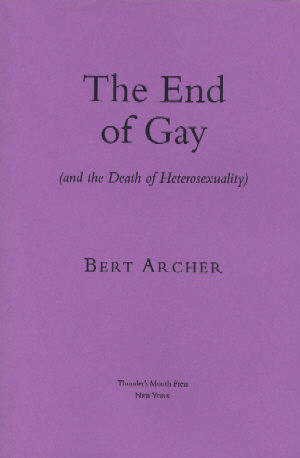
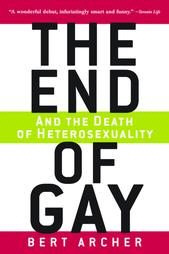
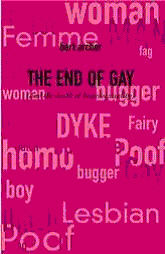
The End Of Gay
In The End Of Gay (And The Death Of Heterosexuality) by Bert Archer, 1999
[Re: Sex] "It would be terrible if the forbidden went from this, it would be terrible if taboo went from this, it would be terrible if we were to be eased into a general state of not so much homogeneity as the idea that everything becomes acceptable. That would be wretched... That's a nightmare of the future for me. It's a nightmare of cloned hermaphrodites who are gently, passionlessly lusting after one another, and then going home to eat the sort of pre-prepared pap they eat in 2001, you know, the red stuff then the green stuff then the white stuff. Horrible."
The Nightmare Series Encyclopaedia: Freddy's Manic Energy
Directed, [ ], The Nightmare On Elm Street Collection DVD, New Line, 1999
"Freddy has this manic energy which is the energy of a testosterone -
driven 15 year old. It has that kind of viciousness, it has that kind
of black humour to it, it has that kind of manic invention to it. It
has that twisted sense of cool to it.
"That's not what's going on in my characters; they seem, to me at least,
spiritually older, worn-out actually, in a curious kind of way - a
little exhausted by the whole game that they've been playing for
millennia. Whereas Freddy's in the moment, right? Freddy's like,
'What can I do now that's going to be mischievious?' and Englund's
performance is hugely to do with that, that sort of sense - you know,
there's an anarchic quality in him, which you see in other
performances by him when he hasn't got the Fedora and the striped
jersey on. But what Wes does, extraordinarily I think, and he doesn't
just do it in the Nightmare pictures, but he has created a world in
which the psychotic energy of the villain can take physical form.
That's an incredibly powerful idea because what it liberates him as a
film-maker to do is give us images we haven't seen before."
The Road To Dracula
Produced, written & directed, David J. Skal, Dracula (1931) DVD, Universal Studios, 1999
"Why are we scared by something? Why are we aroused by something? I'm
talking about sexually aroused. Because, in the case of Dracula, very
often the two responses all fall out.
"[Bela Lugosi] had that thick accent. He had the eyes. He had a series
of gestures which to us now look rather hokey. But, you know, women
fainted, and grown men grew nervous."
Confessions
By Stephen Dressler, Lost Souls, Issue 12, January 1999 (Note : interview took place on 20 December 1998)
"It was interesting to see the new Star Wars picture trailer this
weekend when I went to see Babe. I realised that some of what draws me
to the Book of Hours project is those things you get in Star Wars; a
whole universe of creatures, worlds and landscapes. I hope the Book
of Hours will provide the same pleasures, where you will be able to
step into this place and have a sense that it is totally realised in
paint and poetry. It is an alternative universe, the way Narnia is,
or Middle Earth. The uniqueness of this project is the same hand that
is writing the words is also painting the pictures. I think that will
make this fun for people."
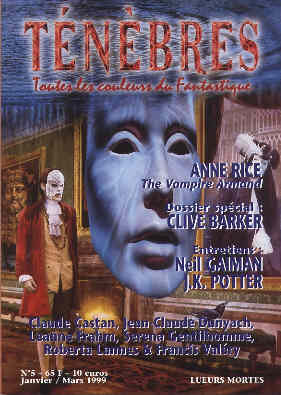
Confession
By Daniel Conrad and Benoît Domis, (i) edited version broadcast in Mauvais Genres, France Culture, 12 January 1999 (ii) Ténèbres, Issue 5, January/March 1999 (Note : interview took place on 16 October 1998, translated from the French.)
"In fact, [Harry D'Amour] appears in the new collection of stories, in the a novella where he will have Pinhead as his adversary. I don't have the title for that novella, but I take enormous pleasure from writing it. Scott Bakula plays the role of Harry in The Lord of Illusions and I think his work is excellent, he truly adapts himself to the character and he resembles Harry exactly as I imagined him when I wrote the film. And what's interesting is that now, when I write about Harry, it's actually Scott who is in my head. Of course, when I write about Pinhead, I imagine Doug. And so, in writing this novella, I have a film developing in my head with Scott and Doug in the principal roles, it's really very funny..."
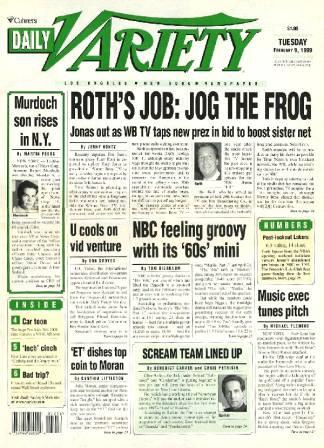
Scream Team Lined Up
By Chris Petrikin and Benedict Carver, Daily Variety, 9 February 1999
[Re American Horror] "Most classic monsters and horror stories tend to be European in origin. I'm not interested in returning to the tired old Gothic type. I want to create a new myth - an American myth... Where I've had most success is creating my own mythology - characters such as Pinhead and Candyman. I don't have a problem with something that lasts for more than one movie. A second picture can often be stronger than the first."
Oscar List Would Please Father Of Frankenstein
By Arthur Spiegelman,
Reuters News, 9 February 1999
"Jimmy's thoughts [in Gods And Monsters] are of the beautiful boys who used to hang around his swimming pool. He is going to meet his maker with a smirk on his face. He has none of the tremendous sadness that the character Tom Hanks played, and won an Oscar for, in 'Philadelphia' had."
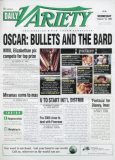
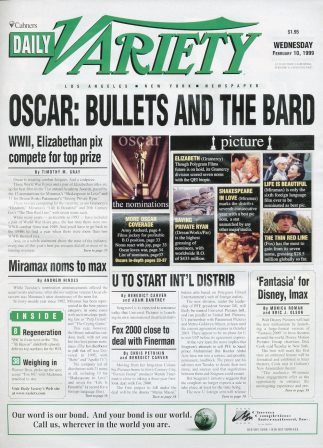
Daily Variety, 10 February 1999
Wakeup Calls Go Better With Oscar On The Line
By Variety Staff,
Daily Variety, 9 February 1999
"We were deliberately very modest in our hopes. The most important thing is the work itself... Everything else has to be the cherry on the cake."
A Demon For Work
By Bob Graham, San Francisco Chronicle, 22 February 1999 - reporting the 'Tapping Your Creative Energy and Imagination' Learning Annex seminar in San Francisco, 20 February 1999 (note : full text online at the Kazmierczak site and the Lost Souls site - see links)
"[Writing fiction] demands that we walk that edge toward a hint of craziness. After all, we are entering another world."
Pet Sounds: Music
By Mike Bradley,
The Times, 27 February 1999
"The title is Being Music. It's the music that inspires the brushes that paint the life-forms which inhabit the worlds I imagine. I
thought the whole thing was a great idea. The fun thing is it's pure indulgence; I mean, to have Sibelius and Perry Como on the
same album... I wanted to put on music that I play over and over again.
"I chose [cover art] that shows the imagination to the fore, ie, the dragon, and the person looking away. It seemed to me that my
function on the album was to show my back, if you like, to show something about me that people didn't usually see."
It's Showtime For Projects Heading To The Big Screen Movies
By Amy Wallace,
Los Angeles Times, 3 March 1999
[re Gods And Monsters] "God bless [Showtime]. At the key time, they were there with a million dollars. They left the practicalities of making the picture to [others]. But certainly, their coming into this picture was the difference between it being made and not being made."
The Dominion
Transcript of an on-line session at The Dominion, website of the Sci-Fi Channel, 8 March 1999 (note : full text online at the Lost Souls site - see links)
"The best part [of fame] is having a forum, the interior and exterior. The worst part is the invasion of privacy that happens. I'm not a public person. It's strange to find folks outside with cameras. I would like to be invisible in a sense. As to handling [it], I deal with that well on some days and poorly on others. I'm not a public person and occasionally I don't react well to be at the center of attention. More and more as I get older. But I do feel blessed, I have a chance to do what I always dreamed of. Expressing the deepest parts of my nature and giving them to others. In my minds eye, I'm a man sitting at a fire telling stories. Sometimes by a miraculous slight of hand making visions appear in the smoke."
The Boy From The Black Stuff
By Demetrios Matheou, The Guardian, 20 March 1999
"I think what Whale does, uniquely, is bring a very personal
sensibility and a gay sensibility into play in a mainstream way, and
make huge successes of these movies, huge successes. In Bride, it's
very overt. Dr Pretorius is a fabulous old queen. Is Pretorius sexually
attracted to Dr Frankenstein? I think so! 'Come up to my place and let
me show you my homunculi.' And this whole idea of creating life without
need of the female is a perversely gay notion. Then you have the Bride
herself, this fabulous, monstrous thing with the Nefertiti hairdo and
this revulsion when she's finally confronted with the opposite sex. I
don't think you have to look very far for evidence.
"Clearly, horror fiction and film is a sexual arena, where gender
issues are addressed very often. What Whale did was make light play of
it. These are not heavy movies at all, and yet they are rich and dense.
If Noël Coward had been making horror movies, this is how they would
have turned out."
Film Studies: Actors Are On His Side
By Hero Brown, Independent on Sunday, 28 March 1999
"Oliver [Parker] was from the beginning an incredibly driven guy. He was relatively young when I met him - I was in my late twenties at the time - but he didn't strike us as being immature at all. Here came this very energetic, incredibly handsome young man, with this amazing willpower and drive. I saw in him some sharp, great ambition, and maybe he saw in me someone with an imagination he could relate to. We were mutually empowering. I think we were all in love with him a little bit for a while."
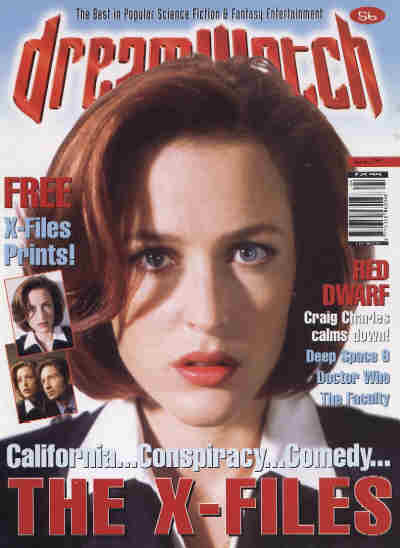
Whom God Destroys
By David Hughes, Dreamwatch, No 56, April 1999
[Re: Gods and Monsters] "We took this project everywhere, [but] you can list the number of things it had against it... When you're going after very different constituencies - a gay constituency, a horror constituency, an old Hollywood constituency - people would say, 'I don't know who it is for.' The truth is it plays for all three and a whole heap more. It has real crossover potential."
Confessions
By [Stephen Dressler and Cheryl Bentzen], Lost Souls, Vol 2 No 1, April 1999
"I think it's time to get behind the camera again. With the success of Gods and Monsters and just enjoying seeing people taking pleasure in that at the Oscars is tremendous. We were enthused from the reaction and I came up with a story that I love. I'm going to do that for New Line and hopefully we will get before the camera next year."
Clive Barker
By Daniel Gouyette, Elegy, No 5, July / August 1999
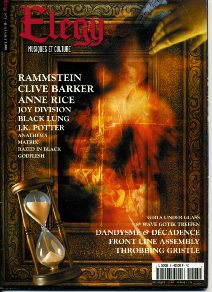 "Several characters in my novels are gay, for example Galilee's sister in Galilee: A Romance, who is lesbian. There is also
a strong gay eroticism in my paintings. The majority of the authors who influenced me are homosexual, like James Whale,
including two who are French: Genet and Cocteau. In Hellraiser, there is a scene which pays homage to Jean Cocteau's The
Blood of a Poet. If you look at my drawings, you will also find his influence there. In the introduction to the collection
The Essential Clive Barker, I report my first vision at 9 years of age of Cocteau's The Testament of Orpheus, the scene where he
is pierced right through by the lance of Minerve, the goddess... He is a model for
me because he worked as well in the theatre as in painting, the cinema or poetry. Cocteau had a very rich imagination."
"Several characters in my novels are gay, for example Galilee's sister in Galilee: A Romance, who is lesbian. There is also
a strong gay eroticism in my paintings. The majority of the authors who influenced me are homosexual, like James Whale,
including two who are French: Genet and Cocteau. In Hellraiser, there is a scene which pays homage to Jean Cocteau's The
Blood of a Poet. If you look at my drawings, you will also find his influence there. In the introduction to the collection
The Essential Clive Barker, I report my first vision at 9 years of age of Cocteau's The Testament of Orpheus, the scene where he
is pierced right through by the lance of Minerve, the goddess... He is a model for
me because he worked as well in the theatre as in painting, the cinema or poetry. Cocteau had a very rich imagination."
Cold Call: Clive Barker
By Alan Jackson, The Times Magazine, 11 September 1999
"In a curious way, this mid-career retrospective [The Essential] is the most concrete, unavoidable evidence I have of the fact [that I'm middle-aged]. I've been writing successfully now for quite a while, and there's the proof. OK, I could have started very young, but I didn't. That's twenty years of adult work."
Forbidden Barker
By Stephen Lemons, New Times Los Angeles, 12 September 1999
"We all think about death and violent death more regularly than we will admit, but most people don't personalize it. What this kind of fiction does is take you inside the experience and ask you to empathize, which is much more important than watching the spectacle of it. I believe we've all made little rehearsals in our minds for what the final moments will be like. A writer does that on a Monday morning at nine o'clock."
BBC Radio 2
Transcript of interview with Janie Lee Grace, BBC Radio 2, 16 September 1999
"I think to be a writer you have to keep your heart really very open - and sometimes that can make you feel very vulnerable. But I think vulnerability is actually part of the issue. I think you've got to be prepared to be foolish. You've got to be prepared to be taking your ideas perhaps one step further than people think is appropriate. You've got to be inappropriate."
BBC Radio 5
Transcript of interview with [ ], BBC Radio 5 Live, 17 September 1999
"It's just not terribly interesting to write horror, to me, anymore. What I want to do is seize people's imaginations. Occasionally, yes, I'll make something scary, but, you know, I like to feel that each book is an adventure. I like to feel as though everything that I make is a new direction, is a fresh direction, and I think that way I pay respect to the reader. I think that way I make something which is challenging me, and if it's challenging me hopefully it's also challenging the reader - I think that's very important."
Renaissance Man
By Miles Fielder, The Scotsman, 18 September 1999
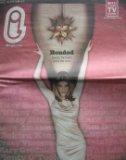 "My great models are William Blake - poet, illustrator - and Jean
Cocteau - playwright, poet, novelist. These guys didn't make a distinction
between what they did. There's a certain artificiality - and it's a
pretty modern phenomenon - about the way we divide our endeavours up.
If you, a writer, are also expressing yourself as a painter, you're
still the same person. The manifestations of my interest in the world
will be many and multifarious. So my attitude always is that I don't
look too closely at myself and my processes. Most times, I just get the
heck on with it. I want to have a crack at that, so it's: 'Let's see
what we can achieve'
"My great models are William Blake - poet, illustrator - and Jean
Cocteau - playwright, poet, novelist. These guys didn't make a distinction
between what they did. There's a certain artificiality - and it's a
pretty modern phenomenon - about the way we divide our endeavours up.
If you, a writer, are also expressing yourself as a painter, you're
still the same person. The manifestations of my interest in the world
will be many and multifarious. So my attitude always is that I don't
look too closely at myself and my processes. Most times, I just get the
heck on with it. I want to have a crack at that, so it's: 'Let's see
what we can achieve'
"I have an invented world quartet of books for children. I have a book
called The Scarlet Gospel, which is a selection of erotic texts
together with 100 illustrations. I have a selection of short stories.
Basically, I have six books on the blocks right now. These explorations
of mine are part of my creative health. The moment you do what's
expected you're cheating your imagination and your readers. I want to
do what's most exciting to me and if that's erotica then, damn it, I'm
going to do erotica. And if it's outlandish children's fantasy then,
darn it, that's what we'll put on the page."
Transcript Of Platform Performance
Interviewed by Russell Manley, Jeffrey Hall, London, 23 September 1999
"I do worry about the relationship between me as a channel, as a conduit, for this material and the material itself. I want to get out of my own way and, at the same time, I want to be aware that somewhere I have to have a life. Art, I think, is a profession - an obsession - which often precludes the simpler rhythms of a life lived... I think extreme is good - anything in the middle, I'm not interested in."
Fantasy Man
By Liza Tarbuck, Channel 4 Big Breakfast, 24 September 1999
[On moving away from the horror genre, having revolutionised it] "If
you've staged a revolution you don't want to then set up the government,
you want to go somewhere else and set up another revolution. I want
to have as many revolutions as I can in my life.
"I did what I could with horror fiction and really enjoyed doing it. It
was great. It was a great time. Now I'm doing children's fiction and
fantasy fiction and I want to be, if you will, as radical in that work
as I can be. Once you've done one thing you feel like, 'Oh, did I do
that to the best of my ability?' And I felt with horror, yes. I'd said
all that I felt I could say and it was time to move on."
Leitmotifs And Dark Beliefs
By Phil & Sarah Stokes, London, 24 September 1999 (note: full text here)
"There's a painting called 'The Annunciation' by Carlo Crivelli, a
Venetian painter, at the National which used to be in a small room in
which this picture dominates. There are three or four other
Crivelli's in the room. And it's not a room where people tend to
linger - people have mixed feelings about Crivelli - but the
painting itself, and I urge you to look at it because it's a
magnificent thing, is a painting filled with ideas. The strongest idea
of which, which I adore, is that the angel which is announcing to Mary
- it's actually a dove - is in the top left-hand-side of the painting
and there's a streak, an elaborately rendered but a totally fantastical
streak. So there's a dove up here and there's light coming through the
picture, breaking the plane of the picture and, here's the smart thing,
breaking the immaculately set up sense of perspective in the painting
to strike Mary who is in the bottom right-hand-side of the picture. And
there are two angels outside her house, one of whom carries an
immaculately rendered model of the City of God. What's
extraordinary about it, besides the fact that it is as completely
invented as anything in Fellini or Terry Gilliam and should be seen
in that light and should be celebrated in that light, is this
magnificent idea that God's gift to the world breaks the reality of
the painting, because that's what God does. I've always tried to
enthuse people about the idea that you look at these paintings and
you look at these things and you hear music not in the light of
something which is hard to do, something which is a sweat, something
which is like being educated, but you look at them in the way that you
pick up a painting, pick up a book that you want to read or you turn
on a television programme, and I think we've been educated largely
into, unfortunately, feeling that this stuff is hard work.
"What I'm asking for from art is that it shake me up, churn me up,
distress me sometimes. But more important than distress, much more
important than distress, it make me sense something larger and more
extraordinary in the world than was there when I first began.
"When you attach the word 'burning' to a tiger and then you put
that burning tiger in the 'forests of the night', you are putting into
my head an image which will never go away because every time, every
time, I look at a tiger from that point on, the flow of its body and
the sheen of its surface remind me of flame. And you've changed the
tiger, you've enhanced the tiger, you've made the tiger more
extraordinary than it was moments before."





